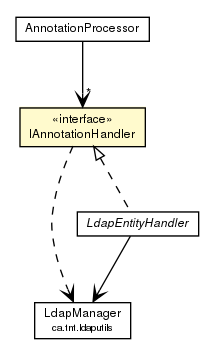
|
||||||||||
| PREV CLASS NEXT CLASS | FRAMES NO FRAMES | |||||||||
| SUMMARY: NESTED | FIELD | CONSTR | METHOD | DETAIL: FIELD | CONSTR | METHOD | |||||||||

public interface IAnnotationHandler
Annotation callback handler. Implement this when you want to process annotations recursively through the entire tree of subclasses.
Created : 21-Aug-2010 11:51:11 PM MST
| Method Summary | |
|---|---|
Class |
getAnnotatedClass()
It is expected that this handler has a reference to the object it wants to operate on. |
Class<? extends Annotation> |
getAnnotationClass()
This is the primary Annotation (with target ElementType.TYPE)
that this handler expects the annotated Class to be annotated with. |
void |
noAnnotation(Class annotatedClass)
Called if no annotation on a particular class exists. |
boolean |
processAnnotation(Annotation annotation,
Class annotatedClass)
Process the annotation on the given annotatedClass. |
void |
setManager(LdapManager managerInstance)
Sets the established ldap manager object, which should be pre-authenticated. |
void |
validateProcessing()
Method for validating the processing of the annotations. |
| Method Detail |
|---|
boolean processAnnotation(Annotation annotation,
Class annotatedClass)
validateProcessing() method
if something went wrong.
annotation - the annotationannotatedClass - the field to process
RuntimeException - The implementor may throw a RuntimeException
from this method. It is recommended that this
does not occur, unless it is severe. First see
validateProcessing()Class getAnnotatedClass()
AnnotationProcessor also needs access to
this object in order to determine annotations on it.
Class<? extends Annotation> getAnnotationClass()
ElementType.TYPE)
that this handler expects the annotated Class to be annotated with. If
the annotated class is annotated with this annotation, this indicates
that this handler supports the Class being processed. If this handler
does not support the Class being processed, the handler will never be
called.
void noAnnotation(Class annotatedClass)
annotatedClass - the class, in the object tree of getAnnotatedClass(), that the annotation was NOT
found on.void validateProcessing()
RuntimeException - if it is determined that a processing error has
occurred that could not be determined until
class hierarchy traversal is completevoid setManager(LdapManager managerInstance)
managerInstance - the already authenticated manager
|
||||||||||
| PREV CLASS NEXT CLASS | FRAMES NO FRAMES | |||||||||
| SUMMARY: NESTED | FIELD | CONSTR | METHOD | DETAIL: FIELD | CONSTR | METHOD | |||||||||
This documentation is part of the LDAP Persistence API (LPA).
Copyright Trenton D. Adams <lpa at trentonadams daught ca>
LPA is free software: you can redistribute it and/or modify it under the terms of the GNU Lesser General Public License as published by the Free Software Foundation, either version 3 of the License, or (at your option) any later version.
LPA is distributed in the hope that it will be useful, but WITHOUT ANY WARRANTY; without even the implied warranty of MERCHANTABILITY or FITNESS FOR A PARTICULAR PURPOSE. See the GNU Lesser General Public License for more details.
You should have received a copy of the GNU Lesser General Public License along with LPA. If not, see GNU Licenses.
See the COPYING file, in the git repository, for more information.